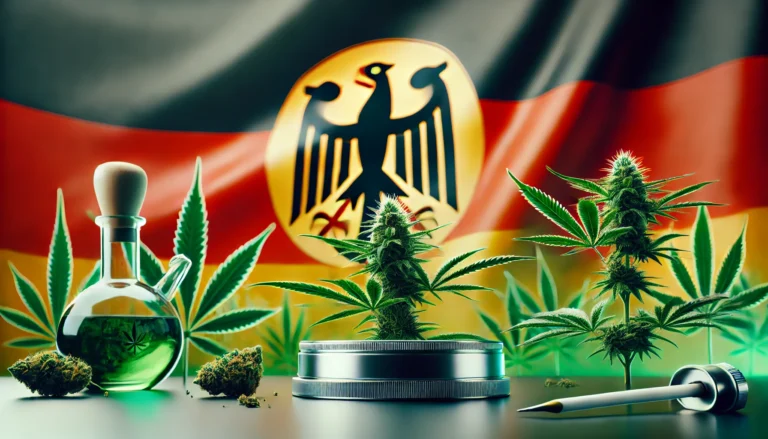Cannabis and State Monopoly: A Proposal by the Five Star Movement
Introduction
The Five Star Movement (M5S) has reignited the debate on cannabis legalization and regulation in Italy with a revolutionary proposal: establishing a state monopoly over the production, processing, and distribution of cannabis. This idea, which has sparked heated political and social discussions, aims to regulate the industry, combat the illegal market, and generate new revenue for the state. But what would the effects of such a measure be? And how are other political forces and civil society reacting?
In this article, we delve into the details of the proposal, the political context, and its potential economic and social implications.
Details of the Proposal
The Five Star Movement proposes to establish a state monopoly for cannabis, managed by the Customs and Monopolies Agency. The stated goal is to regulate all stages of the supply chain, from cultivation to retail, including processing and importation. Essentially, cannabis would be treated like tobacco, with the state monopoly controlling retail sales and issuing licenses to producers.
Key Features of the Proposal:
- State Management: The monopoly would give the government full control over the supply chain.
- Licenses for Producers: The Customs and Monopolies Agency would issue licenses for cultivation and processing.
- Regulated Sales: Sales would only be allowed through authorized channels, reducing the black market.
- State Revenue: Taxes from cannabis sales would provide a significant source of income.
This proposal comes at a time of increasing global discussions about cannabis, with many countries already moving toward legalization or decriminalization.
Objectives of the Proposal
1. Fighting the Black Market
One of the main goals is to combat the illegal cannabis market, which currently generates massive profits for organized crime. By regulating production and distribution, the state could deprive criminal organizations of resources and ensure consumer safety.
2. Tax Revenue
Regulating cannabis could generate significant revenue for the state. According to some estimates, cannabis legalization in Italy could yield up to €7 billion annually in direct and indirect taxes.
3. Quality Control
A state monopoly would ensure the quality of products on the market, setting safety standards for consumers. This is crucial for minimizing the risks associated with contaminated cannabis.
4. Reducing Social Stigma
Legalizing and regulating cannabis would also help reduce the stigma associated with its use, encouraging a more informed and less punitive approach.
The Political Context
This proposal arises during a period of significant transformation for the Five Star Movement. Alongside the cannabis discussion, the M5S is debating internal reforms, including potentially changing its name and symbol.
Government Reactions
The current right-wing government, led by Giorgia Meloni, has strongly opposed any form of cannabis legalization. The Prime Minister emphasized that legalization could send the wrong message, especially to young people, and reiterated her commitment to a zero-tolerance policy.
Internal Debate within the Movement
Even within the M5S, there are differing views. While Giuseppe Conte, the current leader, advocates modernization and policy innovation, founder Beppe Grillo has stressed the importance of maintaining the movement’s core principles to avoid internal divisions.
Economic and Social Implications
1. Economic Benefits
Regulating cannabis could revolutionize the economy. In addition to tax revenue, it could create new jobs in cultivation, processing, and retail. Furthermore, Italy could become a European leader in cannabis production thanks to its favorable climate.
2. Social Impacts
Cannabis legalization could reduce the judicial burden of minor drug offenses and ease the pressure on the prison system. A regulated market would also promote more responsible and informed consumption.
3. Legal Challenges
However, introducing a state monopoly on cannabis would not be without hurdles. Clear and coherent legislation would be necessary to avoid conflicts with European laws and international treaties.
Criticisms of the Proposal
Despite its potential benefits, the proposal has faced criticism. Some argue that a state monopoly could stifle innovation and limit competition, making cannabis less affordable. Others fear that excessive regulation could discourage small producers while favoring large corporations and monopolies.
Conclusion: A Step Toward the Future?
The Five Star Movement’s proposal to establish a state monopoly on cannabis represents a bold and controversial step toward comprehensive industry regulation. While it could bring significant economic and social benefits, it requires thorough debate and careful management to avoid potential pitfalls.
As the world moves increasingly toward cannabis legalization, Italy faces a crucial choice: remain anchored to prohibitionist policies or adopt a more innovative and progressive approach. Regardless of the outcome, the cannabis debate will remain at the center of the political stage, offering food for thought not only for Italy but for the entire European Union.
Pubblicità
🧠 Prova il Ribaltatore
Ribalta questa frase proibizionista con l'AI e scopri l'ironia dietro lo slogan.
Ribalta "Cannabis and State Monopoly: A..."🔍 Frasi Correlate
Cerca altre frasi e contenuti su questo tema nel nostro archivio.
Cerca "Cannabis Legalization"Supporta Canapalandia
Se questo contenuto ti è stato utile, puoi sostenerci: ci aiuta a mantenere il progetto indipendente e aggiornato.






